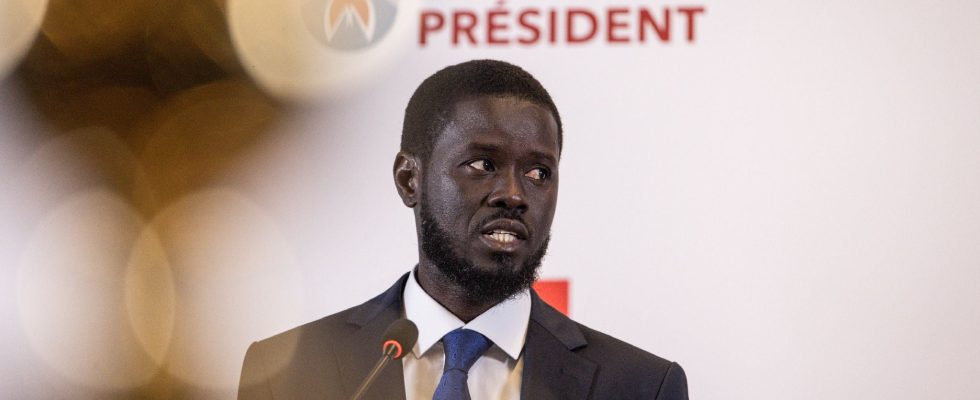Between continuity or change, the Senegalese have decided. The official results announced this Wednesday, March 27 confirm a large victory for the anti-system opposition candidate Bassirou Diomaye Faye, with 54% of the votes, against the candidate of power, accounting for the results of the outgoing president Macky Sall, who only collected 35% of the votes. “By electing me President, the Senegalese people made the choice of rupture,” declared Bassirou Diomaye Faye, who at 44 years old, is the youngest to access this position in his country, during his first speech . What is it really and what are the risks for France?
The election winner’s obsession is to provide his country with true “sovereignty”, a word used 18 times in his program. He intends to renew Senegal’s relationship with its partners and in particular with France. Its objective: to obtain “win-win collaborations”, putting an end to “spoliation”. The candidate, now president, has promised to review fishing agreements with European and Asian trawlers, accused of overfishing to the detriment of Senegalese fishermen. A major challenge as the sector which supports nearly 20% of the 18 million Senegalese people is going through an unprecedented crisis.
In the same vein, Bassirou Diomaye Faye plans to “renegotiate” the oil and gas exploitation contracts with the Australian Woodside and the British BP, while production should begin by the end of 2024 “Renegotiations of which we do not know if they will really be possible,” underlines political scientist Moussa Diaw, while the contracts have already been signed and we largely do not know what they contain. The day after his victory, the new president, however, wanted to reassure Senegal’s partners, some of whom are worried about his coming to power. Senegal “will remain a friendly country and a safe and reliable ally for any partner who engages with us in virtuous, respectful and mutually productive cooperation.”
Questions surrounding the French military base
In recent years, France has not escaped the sometimes harsh criticism from the opposition camp to which Bassirou Diomaye Faye belongs, to the point that many consider him anti-French. “We have nothing against France, nor against Europe,” assures Boubacar Sadio, advisor to the president-elect during the campaign. “We simply want to rebalance our partnerships and diversify them.” Bassirou Diomaye Faye also expressed his desire to review Senegal’s defense contracts. “This could mean the closure of the French military base,” analyzes Caroline Roussy, researcher at Iris. A base, located in the heart of the capital Dakar, currently occupied by 350 soldiers who provide training for soldiers from countries in the region. The French army has already had to leave Mali, Burkina Faso and Niger.
“All these elements, if they are implemented, could contribute to a greater decline of France on the continent”, estimates Moussa Diaw, who nevertheless notes a less brutal discourse towards the former colonial power in the over the last few months. “Ousmane Sonko and Pastef have watered their wine in this regard, out of pragmatism and political realism,” he continues, recalling that France is the country’s leading investor and economic partner.
Claiming to be a “left-wing Pan-Africanist”, Bassirou Diomaye Faye also made a commitment to leave the CFA Franc, perceived as too linked to France. Faced with the concern of economic circles, he stressed that this measure would not be immediate and would only be carried out under certain strict conditions. “Many adjustments have been made to this reform which remains vague to say the least,” indicates Moussa Diaw. In an interview with World, two days before being elected, Bassirou Diomaye Faye tried to explain his thoughts. “The ideal would be to exit the CFA franc within the framework of the Economic Community of West African States (ECOWAS) with the Eco”, the project of a single West African currency, which is slow to see the day. But if the project does not succeed, “we will have to consider taking our sovereignty alone,” he added.
Will he have the means to fight corruption?
Among the key themes of his program is also the fight against corruption and “bad governance” of the elites. These were already his favorite themes when he entered politics in 2014, after more than ten years at the general directorate of taxes and domains alongside the leader of the opposition, Ousmane Sonko, whose candidacy for the last election had been rejected. Throughout the campaign, Bassirou Diomaye Faye denounced the lifestyle of his opponent, Amadou Ba, whom he widely accused of being a “millionaire civil servant”. “I am committed to governing with humility, with transparency and to fighting corruption at all levels,” promised Bassirou Diomaye Faye. To support his claims, he was the only candidate to publish his (modest) declaration of assets. But will he give himself the necessary means to launch into this fight?
Another pillar of his project, “the rehabilitation of the institutions of the Republic”. “It’s about rebalancing legislative, executive and judicial powers and getting out of this hyper-presidentialism that characterizes the country,” explains political scientist Moussa Diaw, professor at Gaston Berger University in Saint-Louis. He thus proposes the abolition of the post of Prime Minister to create a function of vice-president. Will it be intended for Ousmane Sonko, the leader and original candidate of Pastef (the African Patriots of Senegal for work, ethics and fraternity)? The new president promised to reserve a “special place” for him, without specifying which one.
One thing is certain, “there will be no state of grace” underlines Moussa Diaw, explaining that the Senegalese, battered by three years of political crisis, have a lot of expectations. Starting with strong measures to compensate for inflation (at 6%) and unemployment which has been at 20% for 15 years.
.
